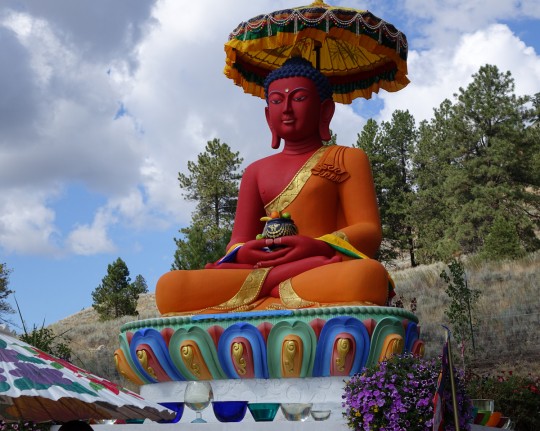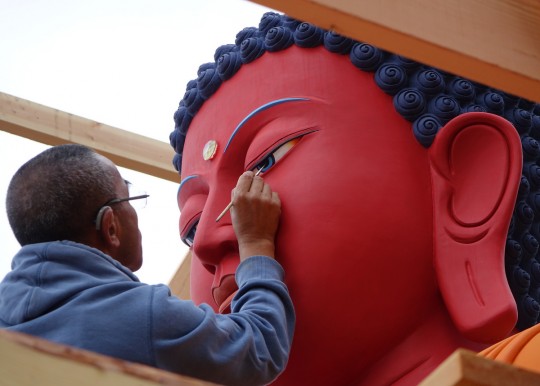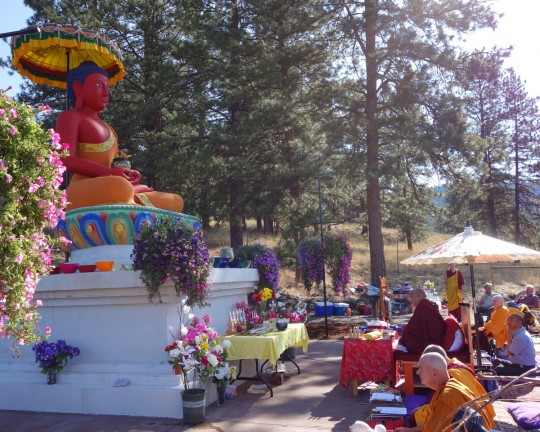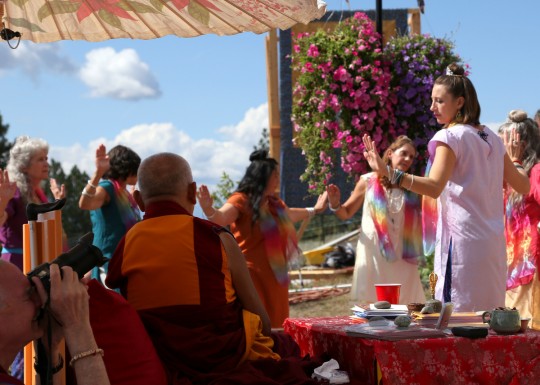- Home
- FPMT Homepage
Foundation for the Preservation of the Mahayana Tradition
The FPMT is an organization devoted to preserving and spreading Mahayana Buddhism worldwide by creating opportunities to listen, reflect, meditate, practice and actualize the unmistaken teachings of the Buddha and based on that experience spreading the Dharma to sentient beings. We provide integrated education through which people’s minds and hearts can be transformed into their highest potential for the benefit of others, inspired by an attitude of universal responsibility and service. We are committed to creating harmonious environments and helping all beings develop their full potential of infinite wisdom and compassion. Our organization is based on the Buddhist tradition of Lama Tsongkhapa of Tibet as taught to us by our founders Lama Thubten Yeshe and Lama Thubten Zopa Rinpoche.
- Willkommen
Die Stiftung zur Erhaltung der Mahayana Tradition (FPMT) ist eine Organisation, die sich weltweit für die Erhaltung und Verbreitung des Mahayana-Buddhismus einsetzt, indem sie Möglichkeiten schafft, den makellosen Lehren des Buddha zuzuhören, über sie zur reflektieren und zu meditieren und auf der Grundlage dieser Erfahrung das Dharma unter den Lebewesen zu verbreiten.
Wir bieten integrierte Schulungswege an, durch denen der Geist und das Herz der Menschen in ihr höchstes Potential verwandelt werden zum Wohl der anderen – inspiriert durch eine Haltung der universellen Verantwortung und dem Wunsch zu dienen. Wir haben uns verpflichtet, harmonische Umgebungen zu schaffen und allen Wesen zu helfen, ihr volles Potenzial unendlicher Weisheit und grenzenlosen Mitgefühls zu verwirklichen.
Unsere Organisation basiert auf der buddhistischen Tradition von Lama Tsongkhapa von Tibet, so wie sie uns von unseren Gründern Lama Thubten Yeshe und Lama Thubten Zopa Rinpoche gelehrt wird.
- Bienvenidos
La Fundación para la preservación de la tradición Mahayana (FPMT) es una organización que se dedica a preservar y difundir el budismo Mahayana en todo el mundo, creando oportunidades para escuchar, reflexionar, meditar, practicar y actualizar las enseñanzas inconfundibles de Buda y en base a esa experiencia difundir el Dharma a los seres.
Proporcionamos una educación integrada a través de la cual las mentes y los corazones de las personas se pueden transformar en su mayor potencial para el beneficio de los demás, inspirados por una actitud de responsabilidad y servicio universales. Estamos comprometidos a crear ambientes armoniosos y ayudar a todos los seres a desarrollar todo su potencial de infinita sabiduría y compasión.
Nuestra organización se basa en la tradición budista de Lama Tsongkhapa del Tíbet como nos lo enseñaron nuestros fundadores Lama Thubten Yeshe y Lama Zopa Rinpoche.
A continuación puede ver una lista de los centros y sus páginas web en su lengua preferida.
- Bienvenue
L’organisation de la FPMT a pour vocation la préservation et la diffusion du bouddhisme du mahayana dans le monde entier. Elle offre l’opportunité d’écouter, de réfléchir, de méditer, de pratiquer et de réaliser les enseignements excellents du Bouddha, pour ensuite transmettre le Dharma à tous les êtres. Nous proposons une formation intégrée grâce à laquelle le cœur et l’esprit de chacun peuvent accomplir leur potentiel le plus élevé pour le bien d’autrui, inspirés par le sens du service et une responsabilité universelle. Nous nous engageons à créer un environnement harmonieux et à aider tous les êtres à épanouir leur potentiel illimité de compassion et de sagesse. Notre organisation s’appuie sur la tradition guéloukpa de Lama Tsongkhapa du Tibet, telle qu’elle a été enseignée par nos fondateurs Lama Thoubtèn Yéshé et Lama Zopa Rinpoché.
Visitez le site de notre Editions Mahayana pour les traductions, conseils et nouvelles du Bureau international en français.
Voici une liste de centres et de leurs sites dans votre langue préférée
- Benvenuto
L’FPMT è un organizzazione il cui scopo è preservare e diffondere il Buddhismo Mahayana nel mondo, creando occasioni di ascolto, riflessione, meditazione e pratica dei perfetti insegnamenti del Buddha, al fine di attualizzare e diffondere il Dharma fra tutti gli esseri senzienti.
Offriamo un’educazione integrata, che può trasformare la mente e i cuori delle persone nel loro massimo potenziale, per il beneficio di tutti gli esseri, ispirati da un’attitudine di responsabilità universale e di servizio.
Il nostro obiettivo è quello di creare contesti armoniosi e aiutare tutti gli esseri a sviluppare in modo completo le proprie potenzialità di infinita saggezza e compassione.
La nostra organizzazione si basa sulla tradizione buddhista di Lama Tsongkhapa del Tibet, così come ci è stata insegnata dai nostri fondatori Lama Thubten Yeshe e Lama Zopa Rinpoche.
Di seguito potete trovare un elenco dei centri e dei loro siti nella lingua da voi prescelta.
- 欢迎 / 歡迎
简体中文
“护持大乘法脉基金会”( 英文简称:FPMT。全名:Foundation for the Preservation of the Mahayana Tradition) 是一个致力于护持和弘扬大乘佛法的国际佛教组织。我们提供听闻,思维,禅修,修行和实证佛陀无误教法的机会,以便让一切众生都能够享受佛法的指引和滋润。
我们全力创造和谐融洽的环境, 为人们提供解行并重的完整佛法教育,以便启发内在的环宇悲心及责任心,并开发内心所蕴藏的巨大潜能 — 无限的智慧与悲心 — 以便利益和服务一切有情。
FPMT的创办人是图腾耶喜喇嘛和喇嘛梭巴仁波切。我们所修习的是由两位上师所教导的,西藏喀巴大师的佛法传承。
繁體中文
護持大乘法脈基金會”( 英文簡稱:FPMT。全名:Found
ation for the Preservation of the Mahayana Tradition ) 是一個致力於護持和弘揚大乘佛法的國際佛教組織。我們提供聽聞, 思維,禪修,修行和實證佛陀無誤教法的機會,以便讓一切眾生都能 夠享受佛法的指引和滋潤。 我們全力創造和諧融洽的環境,
為人們提供解行並重的完整佛法教育,以便啟發內在的環宇悲心及責 任心,並開發內心所蘊藏的巨大潛能 — 無限的智慧與悲心 – – 以便利益和服務一切有情。 FPMT的創辦人是圖騰耶喜喇嘛和喇嘛梭巴仁波切。
我們所修習的是由兩位上師所教導的,西藏喀巴大師的佛法傳承。 察看道场信息:
- FPMT Homepage
- News/Media
-
- Study & Practice
-
-
- About FPMT Education Services
- Latest News
- Programs
- New to Buddhism?
- Buddhist Mind Science: Activating Your Potential
- Heart Advice for Death and Dying
- Discovering Buddhism
- Living in the Path
- Exploring Buddhism
- FPMT Basic Program
- FPMT Masters Program
- FPMT In-Depth Meditation Training
- Maitripa College
- Lotsawa Rinchen Zangpo Translator Program
- Universal Education for Compassion & Wisdom
- Online Learning Center
-
- Prayers & Practice Materials
- Overview of Prayers & Practices
- Full Catalogue of Prayers & Practice Materials
- Explore Popular Topics
- Benefiting Animals
- Chenrezig Resources
- Death & Dying Resources
- Lama Chopa (Guru Puja)
- Lama Zopa Rinpoche: Compendium of Precious Instructions
- Lama Zopa Rinpoche: Life Practice Advice
- Lama Zopa Rinpoche Practice Series
- Lamrim Resources
- Mantras
- Prayer Book Updates
- Purification Practices
- Sutras
- Thought Transformation (Lojong)
- Audio Materials
- Dharma Dates - Tibetan Calendar
- Translation Services
- Publishing Services
- Ways to Offer Support
- Prayers & Practice Materials
-
- Teachings and Advice
- Find Teachings and Advice
- Lama Zopa Rinpoche Advice Page
- Lama Zopa Rinpoche: Compendium of Precious Instructions
- Lama Zopa Rinpoche Video Teachings
- ༧སྐྱབས་རྗེ་བཟོད་པ་རིན་པོ་ཆེ་མཆོག་ནས་སྩལ་བའི་བཀའ་སློབ་བརྙན་འཕྲིན།
- Podcasts
- Lama Yeshe Wisdom Archive
- Buddhism FAQ
- Dharma for Young People
- Resources on Holy Objects
- Teachings and Advice
-
-
*If a menu item has a submenu clicking once will expand the menu clicking twice will open the page.
-
-
- Centers
-
- Teachers
-
- Projects
-
-
-
-
*If a menu item has a submenu clicking once will expand the menu clicking twice will open the page.
-
-
- FPMT
-
- Shop
-
-
-
The Foundation Store is FPMT’s online shop and features a vast selection of Buddhist study and practice materials written or recommended by our lineage gurus. These items include homestudy programs, prayers and practices in PDF or eBook format, materials for children, and other resources to support practitioners.
Items displayed in the shop are made available for Dharma practice and educational purposes, and never for the purpose of profiting from their sale. Please read FPMT Foundation Store Policy Regarding Dharma Items for more information.
-
-
23
Amitabha Buddha Celebrated at Buddha Amitabha Pure Land [Part 2]

Amitabha Buddha statue on Amitabha celebration day, Buddha Amitabha Pure Land, Washington, US, August 2014. Photo by Ven. Roger Kunsang.
By Ven. Holly Ansett
Preparations for Buddha Amitabha Celebration Day
While Gelek painted, Ven. Yarphel started to prepare the grounds for the celebration day, putting woodchips down and hanging giant flower baskets. A few weeks earlier, Rinpoche had said he would like to invite all the neighbors and local students for a big, joyous celebration day and that he wanted to compile a text for the day, which would need to be translated. There would also be many specific offerings that would need to be obtained. In addition, Rinpoche wanted to offer everyone a delicious meal and have musicians playing violins and guitars and dancing, etc. And so started the next month of preparations!
All the things that would be needed for offerings and for the celebration meal needed to be located and many of them needed to be shipped to the land, because the area is so isolated. The Sangha at Rinpoche’s house in California and in the local area all helped to actualize the event by doing everything from sending dried mushrooms and tofu to making intricate brocade banners. The Sangha in California shipped us the seven kings of reign after going to Chinatown in San Francisco as Rinpoche wanted each of the kings to be individually bought. They also sent the eight auspicious signs, a Dharmachakra, a monk’s begging bowl, large conches and many other things.

Artist Gelek Sherpa opening the buddha statue’s eyes at Buddha Amitabha Pure Land, Washington, US, August 2014. Photo by Ven. Roger Kunsang.
During this time of preparation, Rinpoche went into strict retreat and was not speaking at all, and so many instructions were written down on paper or communicated by sign language. At times, it was not 100% clear what was being said, but the Sangha staying with Rinpoche tried their best in silence. One of the most complicated requests was for four large three-foot (one-meter) brocade banners, shaped in a specific way that none of us were familiar with, with hanging tassels and in a very specific color. This was all communicated in silence. The Sangha in Kachoe Dechen Ling in California spent 10 days sewing the banners.
About a week before the day of the celebration, Rinpoche’s retreat had ended and Rinpoche started the task of compiling the Tibetan texts from various sources, primarily Lama Tsongkhapa’s text used for the Mönlam celebration in Lhasa. Rinpoche had Ven. Losang Sherab, a Kopan monk, type the text in Tibetan. Then Rinpoche began carefully translating the 23 pages of text. The translation went all night, every night for about a week. During last two days, it also went most of the day, and so Rinpoche was translating about 18 hours a day with me as scribe.
I tried my best to keep up and not fall asleep. Rinpoche spent a long time choosing words, checking various dictionaries and really putting an incredible amount of effort into the translation. Rinpoche said the text can be used for other celebration days with large thangkas and statues just by changing the main deity. The words are beyond beautiful and are truly an offering practice.
The text consists of inviting the guests, extensive bath offering, mandala offering, prostrations to the 35 buddhas and then making the extensive offerings. Each offering has its own verse explaining the meaning of the offering which is recited when the offerings are held up and offered. At the end, there is the “Praise to Amitabha” by Lama Tsonkhapa and the prayer to be reborn in Sukhavati and then extensive dedication prayers. (The text will eventually be made available by FPMT Education Services.)
Here is an example of these offering verses from the text:
Savior of the transmigratory beings – Guru Amitabha
By offering this Dharma banner to you,
May the transmigratory beings achieve victory over the war of the four Maras
And establish the banner of the teachings of Buddha in the ten directions.
During this process, we had boxes and boxes of offerings arriving at the house – banners, the princess figurine, elephant statues and conches, etc. The delivery people started to ask what was happening and were immediately invited to the celebration day. One of the delivery people came with a camera and took many photos of the statue, I think quite amazed to find this incredible statue here in the middle of nowhere. Each time she came, the statue was transforming – first white, then red, then with eyes opened, and with the flowers surrounding it multiplying.

Lama Zopa Rinpoche showing how to make shemdu – potato, radish, mushroom, ping noodles and rice — which would be the main dish that would be offered on the Amitabha Buddha celebration day, Buddha Amitabha Pure Land, Washington, US, August 2014. Photo by Ven. Thubten Kunsang.
Rinpoche was intimately involved in every aspect of the celebration preparations, including the menu for the day. Rinpoche did a trial run of the menu, inviting Ven. Yarphel, Merry Colony and Harry Sutton to lunch. Rinpoche himself cooked the lunch to show us how to make shemdu – a Sherpa dish of rice, ping noodles, potato, radish, mushrooms and vegetarian tofu sausage and spices – which is what he wanted to be served on the day, as well as a salad topped with feta cheese, oranges and capsicum, and also spring rolls. For dessert, Rinpoche wanted cut fruit and cream. After lunch, Rinpoche wanted to show exactly how to place the flower offerings around the statue on the day.
Ven. Tharchin went to a local meeting with all the neighbors, and they were all invited as well as the many people we have met over the last 10 years in the area and their friends. Rinpoche wanted everyone to come to see Amitabha.
The day before the celebration day, it rained very heavily, which gave us the perfect opportunity to start cooking for more than 70 people with just a few giant pots and one stove. Ven. Thubten Kunsang started cutting vegetables at about 3 p.m. the day before. Pamtingpa Center students helped with the spring rolls, salad and dessert.
Merry was involved with getting much of the material for the many offerings. Both Merry and Harry decorated the incredible umbrella offerings, which Rinpoche wanted to have fringe around the edge and three strings of pearls. The trays of offerings were being made up until 5 a.m. the day of the event. The translation continued also to about 5 a.m. The day before at midnight, Rinpoche said he wanted to start with the consecration of the statue, so the Sangha would need to start at 6 a.m., three hours earlier than planned. The Sangha had to immediately start making the many tormas needed for the consecration. They worked in such a beautiful happy way, ready to do anything, not at all fazed by the change of plan, lack of sleep and work needed to actualize it.
Ven. Roger was putting chairs out at the statue at 6 a.m. The many offerings and tormas were being carried up; flowers were placed; the umbrella was raised above the statue; altars appeared; and food started to arrive, brought by Pamtingpa students. Ven. Kunsang continued working in the kitchen, cooking food, making tea, preparing rice, and then bringing the food up the hill.
Guests and neighbors started to arrive, most never having been to the land, and some never having seen a Sangha person or holy object. The drummers arrived. Rinpoche had asked the musicians to try to play along to the gyaling, which they had practiced. The text was being printed.
The Celebration
The celebration began and Rinpoche was sitting in front chanting each verse of the text in Tibetan. Merry recited the English translation. During the music offering, many kinds of drums were played as well as guitars and conches. The other offerings were made with many people holding up the many horse and elephants figurines, conches, banners, and so on, and then placing them around Amitabha. It was an extremely beautiful and moving practice. A number of Native Americans came to the celebration as the land is close to a reservation. No one seemed fazed by the practice during the celebration and enjoyed sitting back in the sun and watching the offerings and drumming.

Amitabha celebration day, Buddha Amitabha Pure Land, Washington, US, August 2014. Photo by Ven. Roger Kunsang.
By lunch time, there was about 70 people at the celebration. Everyone seemed to enjoy lunch, going back for seconds and thirds. Afterward, many of the neighbors came up to meet Rinpoche, many for the first time. Rinpoche gave them photos, cards and a small verse of Dharma he had translated, which said:
The Savior Nagarjuna, the Second Buddha, the Ancient Great Enlightened Scholar said,
No matter how many times you harm or even kill
External enemies, there will always be more.
But simply killing your own anger
Destroys all external enemies.
The Great Bodhisattva Shantideva said,
Bothersome sentient beings are as limitless as space
And can never be completely overcome.
But simply overcoming your own anger once
Destroys all bothersome sentient beings.
There is not enough leather
To cover the whole earth,
But by simply wearing leather shoes,
It’s as if the whole earth is covered by it.
It is similar with external phenomena.
Once the internal mind is subdued,
All external bother is subdued as well.
Therefore it is good to subdue (or take care of) the mind.
After lunch, the beautiful Tara dancers from Pamtingpa Center walked slowly up the hill in rainbow-colored silky clothes and began the offering of dance to Amitabha Buddha with the giant Tara thangka in the background.

Tara dancers, Amitabha celebration day, Buddha Amitabha Pure Land, Washington, US, August 2014. Photo by Ven. Thubten Kunsang.
Rinpoche finished with the “Praise to Amitabha” and the prayer to be born in Sukhavati and extensive dedication prayers. People slowly left, and we started to pack everything up as clouds were forming. We finished just as an incredible rain storm happened. The following day, Rinpoche left for Mongolia.
Rinpoche seemed very pleased with how the day had gone, the delicious food and the celebration. He said he wanted this to become an annual event, and we’re already looking at the calendar for a time next year. Many people worked incredibly hard to actualize the celebration day and we offer thanks to every one of them. It was an incredible offering to make to Guru Amitabha.
Continued from Part 1 of “Amitabha Buddha Celebrated at Buddha Amitabha Pure Land.”
View more photos from Lama Zopa Rinpoche’s July 2014 visit to Buddha Amitabha Pure Land.
Mandala brings you news of Lama Zopa Rinpoche and of activities, teachings and events from over 160 FPMT centers, projects and services around the globe. If you like what you read on Mandala, consider becoming a Friend of FPMT, which supports our work.
More information, photos and updates about FPMT spiritual director Lama Zopa Rinpoche can be found on Rinpoche’s homepage. If you’d like to receive news of Lama Zopa Rinpoche via email, sign up to Lama Zopa Rinpoche News.
- Home
- News/Media
- Study & Practice
- About FPMT Education Services
- Latest News
- Programs
- New to Buddhism?
- Buddhist Mind Science: Activating Your Potential
- Heart Advice for Death and Dying
- Discovering Buddhism
- Living in the Path
- Exploring Buddhism
- FPMT Basic Program
- FPMT Masters Program
- FPMT In-Depth Meditation Training
- Maitripa College
- Lotsawa Rinchen Zangpo Translator Program
- Universal Education for Compassion & Wisdom
- Online Learning Center
- Prayers & Practice Materials
- Overview of Prayers & Practices
- Full Catalogue of Prayers & Practice Materials
- Explore Popular Topics
- Benefiting Animals
- Chenrezig Resources
- Death & Dying Resources
- Lama Chopa (Guru Puja)
- Lama Zopa Rinpoche: Compendium of Precious Instructions
- Lama Zopa Rinpoche: Life Practice Advice
- Lama Zopa Rinpoche Practice Series
- Lamrim Resources
- Mantras
- Prayer Book Updates
- Purification Practices
- Sutras
- Thought Transformation (Lojong)
- Audio Materials
- Dharma Dates – Tibetan Calendar
- Translation Services
- Publishing Services
- Teachings and Advice
- Find Teachings and Advice
- Lama Zopa Rinpoche Advice Page
- Lama Zopa Rinpoche: Compendium of Precious Instructions
- Lama Zopa Rinpoche Video Teachings
- ༧སྐྱབས་རྗེ་བཟོད་པ་རིན་པོ་ཆེ་མཆོག་ནས་སྩལ་བའི་བཀའ་སློབ་བརྙན་འཕྲིན།
- Podcasts
- Lama Yeshe Wisdom Archive
- Buddhism FAQ
- Dharma for Young People
- Resources on Holy Objects
- Ways to Offer Support
- Centers
- Affiliates Area
- Teachers
- Projects
- Charitable Projects
- Make a Donation
- Applying for Grants
- News about Projects
- Other Projects within FPMT
- Support International Office
- Projects Photo Galleries
- Give Where Most Needed
- FPMT
- Shop
Subscribe to FPMT News
Translate*
*powered by Google TranslateTranslation of pages on fpmt.org is performed by Google Translate, a third party service which FPMT has no control over. The service provides automated computer translations that are only an approximation of the websites' original content. The translations should not be considered exact and only used as a rough guide.The root of your life’s problems becomes non-existent when you cherish others.








